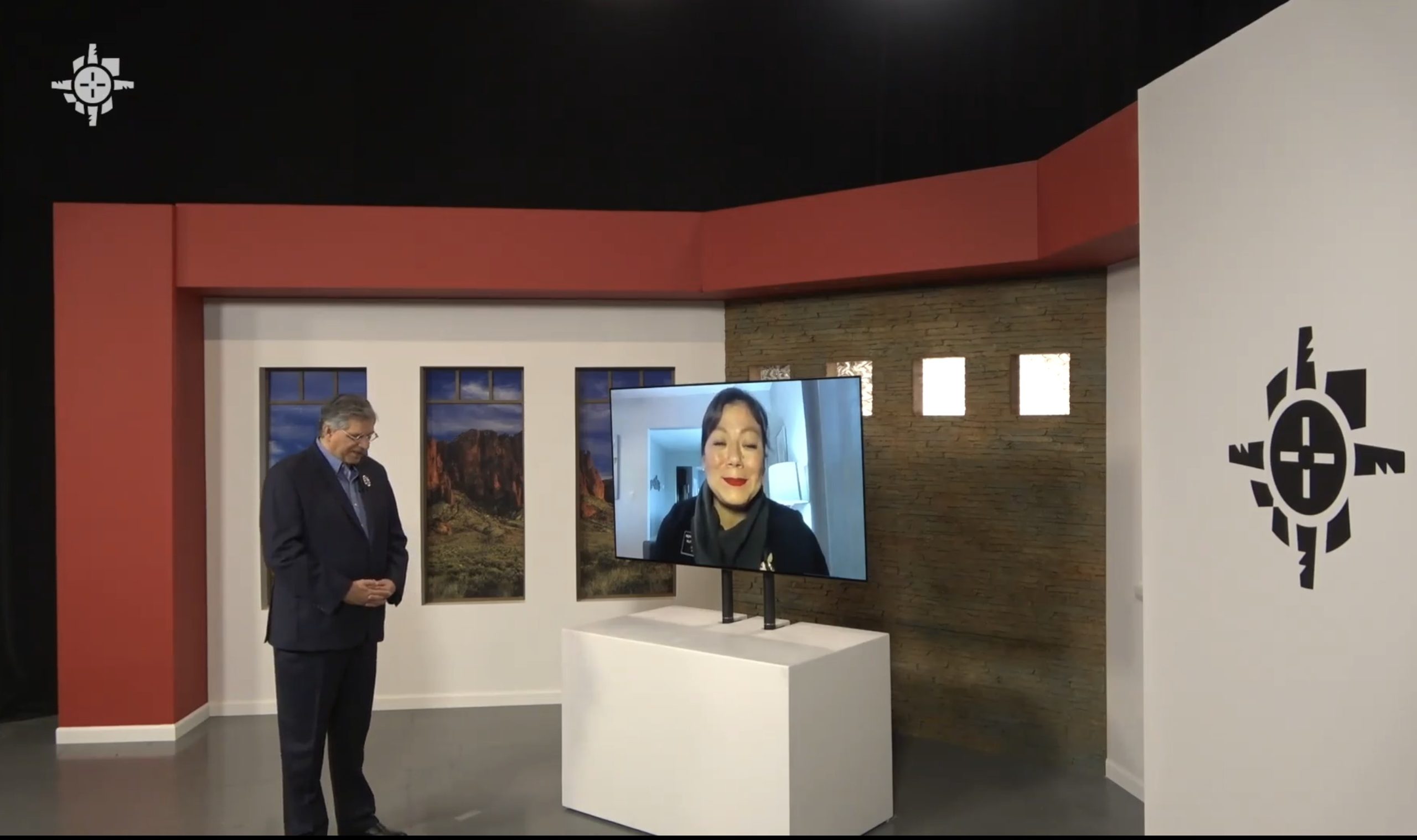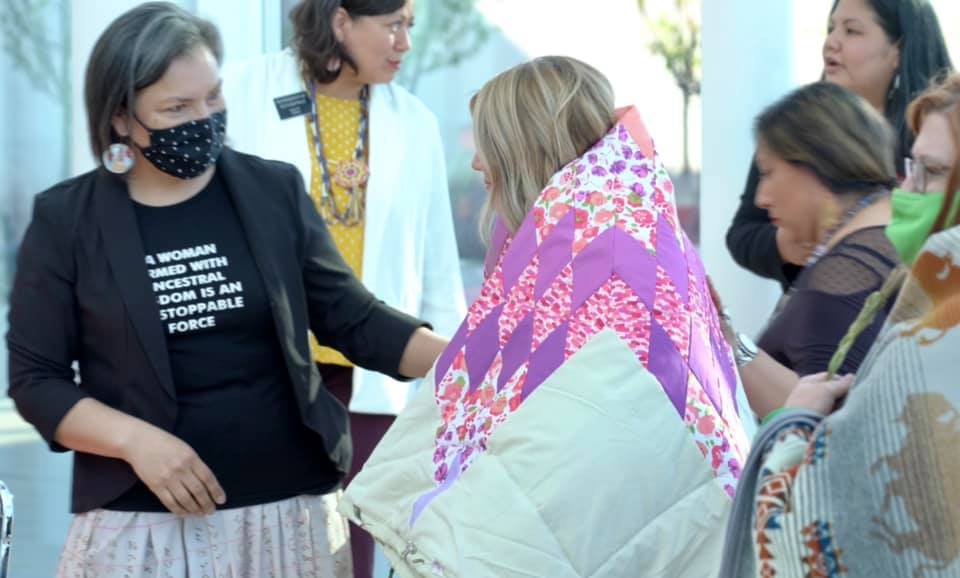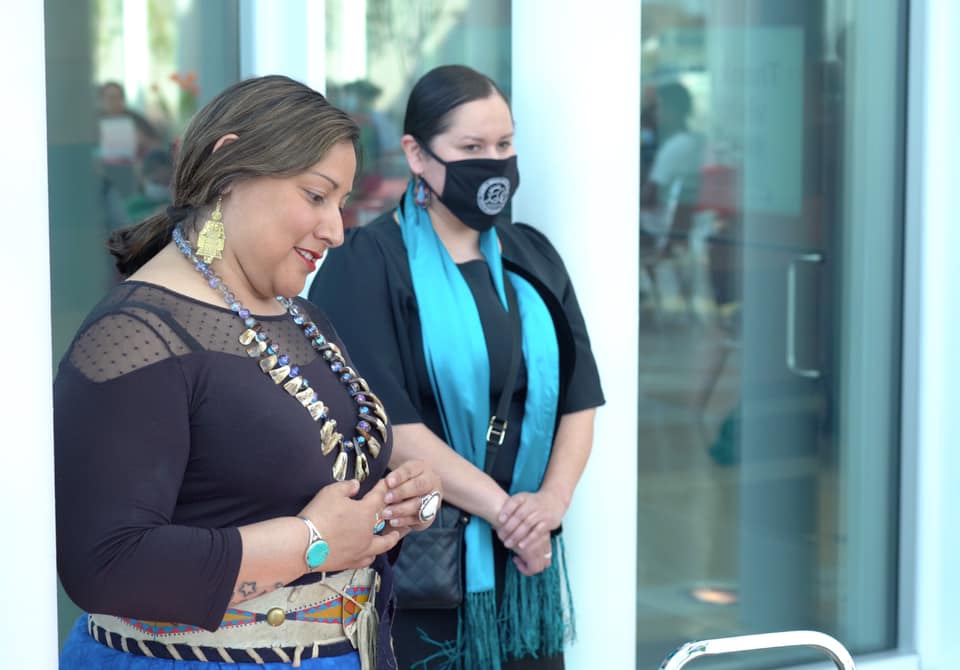News Based on facts, either observed and verified directly by the reporter, or reported and verified from knowledgeable sources.
Native leaders flex political muscle in state legislatures, take on history, voting rights
 Indian Country Today editor Mark Trahant interviews Rep. Ruth Buffalo after the North Dakota Legislature approved Senate Bill 2304.
Indian Country Today editor Mark Trahant interviews Rep. Ruth Buffalo after the North Dakota Legislature approved Senate Bill 2304.
In this year’s 2021 legislative season, Native leaders fought for voting rights of tribal citizens, Native-based curricula, racial inequity, and more, passing momentous bills in Montana and North Dakota.
Lawmakers and Indigenous advocates move forward after an eventful 2021 legislative season. This year’s sessions raised a host of concerns, ranging from voting rights fairness for tribal citizens to penalties for pipeline opponents, Native-based curricula, racial inequity, and transgender legislation.
Lawyers for the Native American Rights Fund, NARF, announced on May 18 they sued Montana over new laws creating Indigenous disenfranchisement in the state electoral process.
Buffalo’s Fire tracked several bills in Montana and North Dakota that reveal Native influence in the most recent legislative sessions. Here are some outcomes of voting rights and other high-profile bills.
Montana’s newly enacted voting rights laws fit a pattern of anti-Native, election-related legislation, according to the Native American Rights Fund. Lawmakers introduced more than 100 bills in 13 legislatures nationwide to disenfranchise Native voters in states with sizable Indigenous electorates.

PHOTO CREDIT/JIM KAMBEITZ
NARF filed suit on behalf of the Blackfeet Nation, Confederated Salish and Kootenai Tribes of the Flathead Reservation, Fort Belknap Indian Community, and the Northern Cheyenne Tribe. The filing challenges the constitutionality of discriminatory voting rights laws.
On trial are House Bill 176, which ends a 15-year practice of same-day voter registration, and House Bill 530, which “attempts to block organized ballot collection on rural reservations,” according to NARF. “These laws are part of a broader scheme by the Montana legislature to attempt to cut out the Native vote,” NARF Staff Attorney Samantha Kelty said in announcing the suit.
Lawyers from the American Civil Liberties Union of Montana and national ACLU — who represent Western Native Voice and Montana Native Vote — joined the NARF litigation. They filed the case at Montana District Court in Billings on May 17, naming Secretary of State Christi Jacobsen as the defendant.
Meanwhile, in April, the Montana House of Representatives nixed H.B. l 613, which would have provided reservation voters better access to ballot boxes. Rep. Sharon Stewart-Peregoy from Crow Agency was the bill’s primary sponsor.
Also in Montana, Buffalo’s Fire tracked House Bill 481, which sought to fortify penalties against anyone who damages critical infrastructure projects, such as pipelines. It prescribes punishments ranging from a $1,500 fine and six months in prison to $150,000 and 30 years.
“Rep. Ruth Anna Buffalo is a true leader as she works to ensure the voices of the ancestors, children, elders, and Indigenous people are accounted for and heard.”
Joyce T. Shining One Side, an elder, culture and language teacher from the Turtle Mountain Band of Chippewa Indians
Jestin Dupree, a council member of the Fort Peck Tribal Executive Board, argued against the bill at a hearing. It “seeks to beat Montana citizens into submission so that multinational corporations can pillage our lands and pollute our waters,” he said.
Though Dupree’s sympathizers fought hard against the bill, it passed. Gov. Greg Gianforte signed it into law. Montana now joins 14 other states approving similar measures. They follow a model created by the American Legislative Exchange Council that was written in 2017. It is a response to a yearlong standoff between oil pipeline fighters and militarized police over the Dakota Access Pipeline at Standing Rock. Forty states have at least broached similar legislation.
In North Dakota, Rep. Ruth Buffalo, Fargo, worked with a statewide coalition to lead passage of a momentous Native history bill she wrote. Senate Bill 2304 requires all K-12 schools include Native American history in statewide curricula. The bill emerged from a legislative labyrinth after nearly dying in a 47-47 vote.
Buffalo convinced her colleagues in the Legislature to keep the bill rolling forward. She asked several of them to bring up the proposal for a second vote. They respectfully told her “no” many times. Finally, District 18 Rep. Steve Vetter of Grand Forks agreed to move for reconsideration. With Gov. Doug Burgum’s signature, the law becomes effective Aug. 1.
Buffalo, who had exhausted her five-bill quota, sought assistance from fellow lawmakers to introduce the history bill. The baton landed in the hands of Senate Minority Leader Joan Heckaman and Sen. Richard Marcellais. Heckaman then introduced the Native history bill to the North Dakota Legislature.
Indian Country Today interviewed Buffalo regarding her persistence in achieving the legislation’s passage. “I’ve had the privilege of watching Ruth Buffalo campaign for office,” said ICT editor Mark Trahant. “Very few politicians work harder. And she brought that same commitment to her work in the Legislature. Now there’s a payoff.”
The law, said Trahant, goes down as part of American history.
After the bill’s passage, members of a grassroots coalition who supported the bill recently gathered at the North Dakota Heritage Center to celebrate. The group honored Buffalo with a star quilt and an honor song.
“Without her leadership, many less fortunate, including women, would not have a voice at the table. Now we have Indian education for all in North Dakota, a red state at that,” said Shining One Side, also the Title VI project director at Dunseith Public Schools.
Buffalo is originally from Mandaree on the Fort Berthold Reservation. She became the first Native woman Democrat elected to the North Dakota statehouse in 2018.

In 2021, she introduced a bill to establish a Truth, Healing and Reconciliation Commission. Her House Bill 1488 sought to provide a forum for Native people to share their experiences on historical inequalities between the state of North Dakota and tribes. The bill failed but inspired a conversation statewide. The goal is to help heal scars of racism and bigotry, she said.
“There’s still a lot of community support on that bill for healing,” said Buffalo. “In order to get to a place of healing, we know we need to have these uncomfortable conversations.” Education coalition members are determined to move forward with the idea, she added. Buffalo expects a future commission to consist of fact-finders who gather testimonials from tribal citizens about interactions with the state government.
In other legislative matters, North Dakota’s House Bill 1298 caused commotion at the statehouse. Its co-sponsor Rep. Kathy Skroch and sympathizers wanted it to enshrine what she termed “biological base standards for female sports competition.” Members of both legislative chambers hashed out a shared vision and approved an amended bill with the same underlying result of keeping transgender athletes from competing alongside biological females in state-funded school sports.
The bill sparked national interest. Mashpee Wampanoag tribal parent Paula Peters told Buffalo’s Fire the bill would be discriminatory to her transgender child. “Traditionally, Native people saw transgender people as two-spirited. That was something to honor and support until colonial settlers came,” she said.
In the end, Gov. Burgum vetoed the legislation, saying that the record provides no evidence that fairness in girls’ sports is in danger. However, the American Civil Liberties Union reported that 30 states have entertained similar legislation.
Christian Hustad is an Assiniboine content creator; you can contact him at cjhustad.94(at)gmail.com.
Jodi Rave Spotted Bear contributed to this story. She is the founding director of the Indigenous Media Freedom Alliance, a 501-C-3 nonprofit organization, located on the Fort Berthold Reservation in North Dakota. Contact her at jodi(at)imfreedomalliance.org
Talli Nauman contributed to this story. She is the co-director of Journalism to Raise Environmental Awareness.

